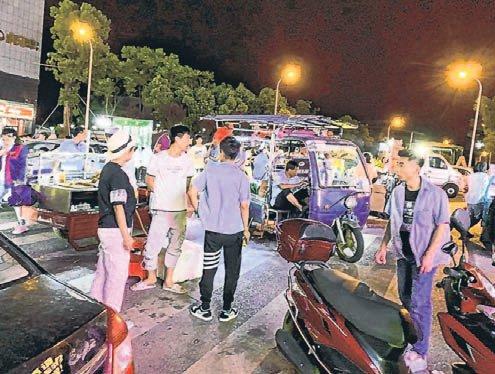Chinese Suppliers Now Shun Uyghur Workers
本文翻译自7.21华尔街日报
内容涉及到的公司名字来自百度翻译,如果有误,请联系本人。
Chinese Suppliers Now Shun Uyghur Workers
中国供应商现在避开维吾尔族工人
By Liza Lin in Singapore, Eva Xiao in Hong Kong and Yoko Kubota in Liuyang, China

Chinese factories that supply Apple Inc., Nike Inc., and make other products sold in the U.S. are shunning workers from Xinjiang, as Western countries increase scrutiny of forced labor from the remote northwestern region where Beijing has been accused of committing genocide against local ethnic minorities.
为苹果、耐克等在美国销售产品的公司提供材料的中国工厂正在回避来自新疆的工人,因为西方国家加大了对来自中国西北边远地区的强迫劳动的审查力度。中国被指对当地少数民族犯下种族灭绝罪。
Lens Technology Co., a Chinese maker of smartphone touch screens and supplier to Apple and other companies, phased out Uyghur factory workers transferred from Xinjiang through a state-backed labor program last year, former staff and shop owners near one of its factories said.
蓝思科技是中国智能手机触摸屏制造商,也是苹果和其他公司的供应商。该公司一家工厂附近的前员工和店主表示,该公司逐步淘汰了通过富余劳动力转移就业计划从新疆调来的维吾尔族工厂工人。
The company has also stopped hiring Uyghur workers, current staff said.
该公司目前的工作人员说,该公司还停止雇用维吾尔族工人。
Chinese mask producer Hubei Haixin Protective Products Group Co., whose personal protective equipment is sold on U.S. e-commerce sites, no longer employs laborers from Xinjiang, a company employee said. The company decided not to renew the contracts of its Xinjiang laborers in September after reports last year alleging the use of forced labor drew negative attention, the employee said.
中国面具生产商湖北海信防护用品集团有限公司的一名员工说,该公司的个人防护用品在美国电子商务网站上销售,该公司不再雇用来自新疆的劳工。这名员工说,去年9月,有关使用强迫劳动的报道引起负面关注,公司决定不再续签新疆劳工的合同。
And a Chinese subsidiary of Taekwang Industrial Co., which makes sneakers for U.S. sports giant Nike in China, sent workers from the region home in the second quarter of 2020, according to a Nike statement that was on the company’s website in June 2020. The company’s statement has been updated, but the old version has been stored by the Internet Archive, a nonprofit that keeps a digital library of webpages.
泰光实业(Taekwang Industrial Co.)的一家中国子公司为美国体育巨头耐克(Nike)在中国生产运动鞋,根据耐克(Nike)于2020年6月在其网站上发表的一份声明,该公司于2020年第二季度将该地区的工人遣送回国。公司的网页已经更新了,但是旧版本已经被互联网档案馆保存了下来,这是一个非盈利组织,它保存着一个网页的数字图书馆。
It couldn’t be determined if Xinjiang workers at Lens facilities were producing components that ended up in Apple products. An Apple spokesman said in the past year and a half, the company conducted more than 1,100 audits and interviewed 57,000 workers to check if suppliers were following its standards. The company’s Supplier Code of Conduct prohibits any kind of discrimination. “We will continue doing all we can to protect the rights of workers across our supply chain, and ensure everyone is treated with dignity and respect,” he said.
无法确定蓝思工厂的新疆工人是否在生产最终用于苹果产品的组件。苹果发言人说,在过去的一年半里,该公司进行了1100多次审计,并约谈了57000名员工,以检查供应商是否遵守了苹果的标准。公司的供应商行为准则禁止任何形式的歧视。”我们将继续尽我们所能保护整个供应链中工人的权利,确保每个人都得到尊严和尊重。”。
Spokespeople from Nike and Taekwang declined to comment.
耐克和泰光的发言人拒绝置评。
The about-face by Chinese suppliers that have collectively hired thousands of Xinjiang workers through government-backed labor programs highlights the growing pressure that firms face as Western governments push multinationals to eliminate forced labor from their supply chains in China.
通过政府支持的富余劳动力转移就业项目,中国供应商集体雇佣了数千名新疆工人,这些供应商的变脸突显出,随着西方政府推动跨国公司从其在华供应链中消除强迫劳动,企业面临的压力越来越大。
Rights groups and Western researchers have accused Xinjiang authorities of mass internment and exploiting what the Chinese government calls labor-transfer programs to force Uyghurs and other Turkic Muslims from the region to work at factories around the country.
人权组织和西方研究人员指责新疆当局大规模拘留,并利用中国政府所称的劳动力转移计划,迫使该地区的维吾尔族和其他突厥穆斯林到全国各地的工厂工作。
Washington, the most vocal critic of Beijing’s policies in Xinjiang, has taken aim at such labor transfers by issuing import bans on cotton, tomatoes and polysilicon from the area over the past year. In response, many multinationals have organized supply-chain audits in China, while trying to avoid provoking Beijing. Last week, the Senate passed the Uyghur Forced Labor Prevention Act by unanimous consent. The bipartisan bill, which faces likely approval in the House, would ban goods produced by Xinjiang workers in state-run programs unless importers prove otherwise.
华盛顿,对北京在新疆的政策最强烈的批评,在过去的一年里通过对该地区的棉花、西红柿和多晶硅发布进口禁令,瞄准了这种劳动力转移。作为回应,许多跨国公司在中国组织了供应链审计,同时试图避免激怒北京。上周,参议院一致通过了《维吾尔族强迫劳动预防法》。这项可能在众议院获得批准的两党法案将禁止新疆工人在国营项目中生产的商品,除非进口商另有证明。
Beijing has denied all rights-abuse allegations and has said state-run transfers of Uyghur, Kazakh and other mostly Muslim minority laborers are part of poverty-alleviation programs. Such workers might be punished for speaking out about their working conditions, rights groups said, while auditing firms said the workers are wary of retaliation, making it difficult to verify to what extent the programs are involuntary.
北京否认了所有侵犯人权的指控,并表示,维吾尔族、哈萨克族和其他主要是穆斯林少数民族劳工的国营转移是扶贫项目的一部分。人权组织说,这些工人可能会因为说出自己的工作条件而受到惩罚,而审计公司说,这些工人对报复持谨慎态度,因此很难核实这些项目在多大程度上是非自愿的。
Uyghur and labor-rights groups said it is a step in the right direction for Chinese suppliers to refrain from such programs, but want brands to also ensure workers are compensated when they leave and aren’t simply transferred to less visible and more poorly run factories through the same state-backed labor program.
维吾尔族和劳工权益组织表示,中国供应商避免此类计划是朝着正确方向迈出的一步,但他们希望各品牌也能确保工人在离开时得到补偿,而不是通过同样的国家支持的劳工计划,简单地转移到不太显眼、经营状况更差的工厂。
Before Lens Technology let go of its Xinjiang workers last year, the touch-screen manufacturer was an active participant in the local government’s labor-transfer program.
在蓝思科技去年解雇其新疆员工之前,这家触摸屏制造商是当地政府劳动力转移计划的积极参与者。
But last summer, as scrutiny on Xinjiang grew, the company let go more than 400 workers from Xinjiang working at Lens’s main facilities in Liuyang, a city under the administration of the Hunan provincial capital of Changsha, where the company is headquartered.
但去年夏天,随着对新疆的审查力度加大,蓝思公司解雇了400多名来自新疆的工人,他们在蓝思总部所在地湖南省省会长沙市浏阳的主要工厂工作。
The fired workers were given between $1,500 and $2,900 in compensation because they were let go before their contract ended, said a former Lens worker who was among those cut loose and returned home to Xinjiang. Some of the workers then attended a new training program and were sent to work in Jinhua city in eastern China and at a mask factory in Changsha, the worker said.
被解雇的工人得到了1500到2900美元的补偿,因为他们在合同结束前被解雇了,一位被解雇并返回新疆的前镜头工人说。这名工人说,一些工人随后参加了一个新的培训项目,被派往中国东部的金华市和长沙的一家面膜厂工作。
The company isn’t hiring any Uyghur factory workers this year, two hiring agents at Lens said. Lens didn’t respond to requests for comment.
蓝思的两名招聘代理说,公司今年没有招聘任何维吾尔族工人。蓝思没有回应置评请求。
As scrutiny over forced labor from Xinjiang mounts, some factories are phasing out participation in state-run labor programs to avoid getting hit with restrictions on exporting to the U.S. Human-rights groups said that while factories opting out of labor-transfer programs is a positive development, cutting ties with Xinjiang workers across the board is discriminatory. They said suppliers should opt out of state-backed labor transfers but continue to hire Xinjiang workers who apply independently.
随着对来自新疆的强迫劳动的审查越来越严格,一些工厂正在逐步停止参与富余劳动力转移就业项目,以避免受到限制向美国出口的影响。人权组织说,虽然工厂选择退出劳动力转移项目是一个积极的发展,全面切断与新疆工人的联系是歧视性的。他们说,供应商应该选择不接受国家支持的劳动力转移,但继续雇佣独立申请的新疆工人。
“These factories appear to care more about preventing scandals than fair-hiring practices,” said Maya Wang, senior China researcher at Human Rights Watch.
人权观察(Human Rights Watch)中国高级研究员王玛雅(Maya Wang)说:“这些工厂似乎更关心防止丑闻的发生,而不是公平的招聘做法。”。
发表评论